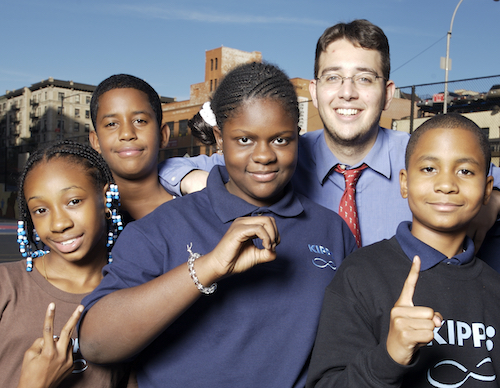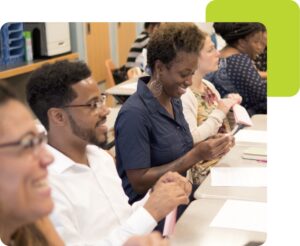Joe: Five with a Founder

Every opportunity I have to interact with students, staff, and family, I do my best to model how I would want to be treated...
Joe Negron, Founding Principal, KIPP Beyond Middle School
Joe Negron is the founding school leader of KIPP Beyond Middle School, the first intentionally integrated public charter school across the KIPP national network. Joe began his career as a Teach For America corps member, teaching middle school math and science in Washington Heights. During this time, Joe also earned his M.A. from Teachers College, Columbia University. In 2005, Joe became the founding principal of KIPP Infinity Middle School. After seven years as a principal, Joe returned to the classroom as a sixth-grade math teacher and received KIPP’s highest honor, the Harriett Ball Excellence in Teaching Award. During his time at KIPP, Joe has also been the co-principal of KIPP STAR Middle School as well as the Managing Director of Middle Schools. Joe was also the first in his family to graduate from a four-year college when he graduated from Harvard in 2001.
KIPP Beyond will be an “intentionally integrated” school in the most segregated school district (District 3) in New York City, which is one of the most segregated school systems in the United States. How do you achieve integration intentionally and why is it important for students?
Community School District 3 is a racially and socioeconomically diverse district. About half of its families qualify for free and reduced-price lunch. It’s about 32% white, 20% Black, 32% Latino, 10% Asian and 6% multi-racial. Over time, we want our school to reflect that level of diversity, but there is a difference between a school that is diverse and a school that is integrated. Diversity is counting people, making sure you are working towards those percentages I mentioned. Integration is making people count, making sure you have the systems and structures within your school, making sure that all students and families feel included; that power is shared in decision making. And that ultimately it’s a school that is doing right by all kids and families.
On a social-emotional front, we plan to have a robust advisory system that focuses on both celebrating and exploring one’s own identity and focusing on building healthy relationships across lines of difference. We want students to build perspective and learn from those whose views or experiences might be different from their own.
The research is clear regarding the benefits of an integrated environment – there are emotional and academic benefits for all kids. Students in these settings show more critical and flexible thinking, become more empathic people, and have reduced racial bias.
Describe a program or design element that you are pioneering at KIPP Beyond and that is inspired by your prior teaching and leading experiences?
We’re really excited about meditation. For anyone who knows me, that’s not something I would have said a few years ago! That’s been inspired in part by school visits across the country and, in part, to the move to more mindfulness practices throughout KIPP NYC schools. Particularly after this year, we know it’s more important than ever for our kids to have time to quiet their minds. Whether or not they’re showing it, every child has experienced some level of trauma or stress over this past year. They’ve also been in front of a lot of screens. At KIPP Beyond, we are providing an opportunity twice a day for 15 minutes for students to quiet their mind, to re-center themselves. And we’re really, really excited about that.
We’ve also been given this incredible opportunity for our staff to be trained in transcendental meditation by the folks at the David Lynch Foundation. And, hopefully over time, we’ll be able to do the same with our families if they are interested. Time and time again, we hear from our alumni that we must prioritize mental health. We’re excited to provide students at our school the opportunity to meditate as a tool for their own self-care, and hope they will take it with them once they leave our school.
How will you partner with families as you design and develop KIPP Beyond?
We are currently having families and students help, and gather their input and feedback, with the design of our school logo and colors. We recently got a submission by a father/daughter group; that’s beautiful to see families thinking about what they want to see their school look like, quite literally. We are engaging in this co-creative process for so many different aspects of our school, from electives and co-curriculars – we have a survey out and kids/families are sharing what they want to see at their school – to how we are going to approach different school systems and structures. What do we want our dress code to look like? What do we want our hallways to look and sound like? When I opened KIPP Infinity, those were told to students and families; we are flipping that on its head. We are putting real authentic agency and power in the hands of students and families.
How will you engage with the school’s surrounding community?
For the past 3 years, I have been deeply engaged in Community Education Council meetings because I believe that the mission of a public charter school is to both be a laboratory of innovation and to share what has and what hasn’t worked with our neighboring school communities. I remain incredibly committed to that cause. We’ve also made the intentional decision to not have an instructional dean, and instead have hired a Director of Enrichment & Engagement because we know how important it is to be partnering with our community.
In co-founding this school alongside [KIPP Beyond Social Studies teacher] Jeff [Li], we really wanted to model opening a school with the community; and, in doing so, you can’t just talk to the people who agree with you. You become a more informed citizen when you authentically engage with people whose viewpoints differ from yours. I truly feel like the way in which we have gone about starting this school has lived up to that message.
You have a great deal of school leadership experience. Can you share one of the best pieces of advice you received as a school leader or when you were a teacher that has made a meaningful impact on students since you took that advice?
James Baldwin once said, ‘Children have never been very good at listening to their elders, but they have never failed to imitate them.’ I have taken that ethos and translated that for what it means to be a school leader. Every year that I was a school leader, I also taught at least one section of math. Selfishly, I did this because I absolutely love teaching. At the same time, it helped ground decisions that were made in the school; whatever I’m asking of the teachers, I, myself, must be willing to do in the classroom. And it always reminded me how humbling, difficult, and rewarding the job of a teacher is. I think it made me, and will continue to make me, a better school leader for it.
Every opportunity I have to interact with students, staff, and family, I do my best to model how I would want to be treated, how I would want my students to be treated, and how I would want my own kids to be treated. Ultimately, my own three little boys will be going to KIPP Beyond over the next decade – I’m excited to be there when that happens.

